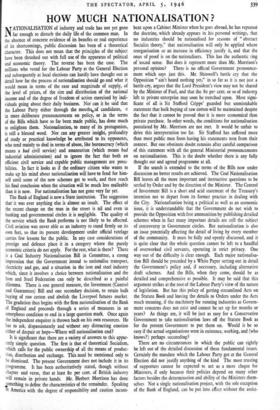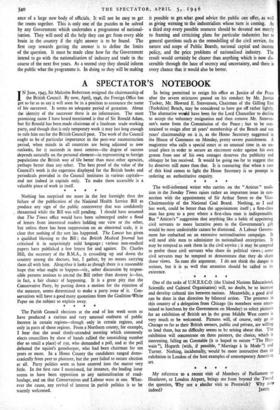HOW MUCH NATIONALISATION ?
ATIONALISATION of industry and trade has not yet gone 11 far enough to disturb the daily life of the common man. In the absence of concrete evidence of its benefits or real experience of its shortcomings, public discussion has been of a theoretical character. This does not mean that the principles of the subject have been thrashed out with full use of the apparatus of political and economic theory. The reverse has been the case. The millions who voted for the Labour Party at the General Election and subsequently at local elections can hardly have thought out in detail how far the process of nationalisation should go and what it would mean in terms of the ease and magnitude of supply, of the level of prices, of the size and distribution of the national income and of the degree of freedom of action exercised by indi- viduals going about their daily business. Nor can it be said that the Labour Party either through the mouths, of candidates, it in more deliberate pronouncements on policy, or in the terms of the Bills which have so far been made public, has done much to enlighten them. Nationalisation, to many of its protagonists, is still a blessed word. Nor can any greater insight, profundity of study or practical knowledge be attributed to its opponents, who tend mainly to deal in terms of abuse, like bureaucracy (which means a bad civil service) and amateurism (which means bad industrial administration) and to ignore the fact that both an efficient civil service and capable public management are possi- bilities. In fact it looks as if the ordinary citizen who wants to make up his mind about nationalisation will have to fend for him- self until some of the new schemes get to work, and then reach his final conclusion when the situation will be much less malleable than it is now. For nationalisation has not gone very far yet.
The Bank of England is now a State institution. The suggestion that it was ever anything else is almost an insult. The effect of the recent change on the man in the street is nil and even in banking and governmental circles it is negligible. The quality of the service which the Bank performs is not likely to be affected. Civil aviation was never able as an industry to stand firmly on its own feet, so that its present development under official tutelage carries few lessons for the public. In any case considerations of prestige and defence place it in a category where the purely economic criteria do not apply. For the rest, what is there? There is a Coal Industry Nationalisation Bill in Committee, a strong impression that the Government intend to nationalise transport, electricity and gas, and a situation in the iron and steel industry which, since it involves a choice between nationalisation and the Iron and Steel Federation can only be described as a painful dilemma. There is one general measure, the Investment (Control and Guarantees) Bill and one secondary decision, to retain bulk buying of raw cotton and abolish the Liverpool futures market. The gradation thus begins with the firm nationalisation of the Bank of England and proceeds through a series of measures in an amorphous condition to end in a large question mark. Once again the independent enquirer is thrown back on his own resources. He has to ask, dispassionately and without any distracting emotion either of despair or hope—Where will nationalisation end?
It is significant that there are a variety of answers to this appar- ently simple question. The first is that of theoretical Socialism, which calls for the public ownership of all the means of produc- tion, distribution and exchange. This need be mentioned only to be dismissed. The present Government does not include it in its programme. It has been authoritatively stated, though without chapter and verse, that at least 8o per cent. of British industry will remain in private hands. Mr. Herbert Morrison has done mething to define the characteristics of the remainder. Speaking In America with the degree of responsibility and caution incum- bent upon a Cabinet Minister when he goes abroad, he has repeated the doctrine, which already appears in his personal writings, that no industries should be nationalised for reasons of " abstract Socialist theory," that nationalisation will only be applied where reorganisation or an increase in efficiency justify it, and that the onus of proof is on the nationalisers. This has the authentic ring of sound sense. But does it represent more than Mr. Morrison's personal opinion? There is no official Government pronounce- ment which says just this. Mr. Shinwell's battle cry that the Opposition " ain't heard nothing yet,'" in so far as it is not just a battle cry, argues that the Lord President's view may not be shared by the Minister of Fuel, and that the 8o per cent. or so of industry left to private enterprise may soon be trenched upon. Most signi- ficant of all is Sir Stafford Cripps' guarded but unmistakable statement that bulk buying of raw cotton will be maintained despite the fact that it cannot be proved that it is more economical than private purchase. In other words, the conditions for nationalisation postulated by Mr. Morrison are not met. It would be unfair to drive this interpretation too far. Sir Stafford has suffered more than most public men from having his statements torn from their context. But one obstinate doubt remains after careful comparison of this statement with all the general Ministerial pronouncements on nationalisation. This is the doubt whether there is any fully thought out and agreed programme at all.
If the search is extended to the terms of the Bills now under discussion no better results are achieved. The Coal Nationalisation Bill leaves all the more important and instructive questions to be settled by Order and by the direction of the Minister. The Control of Investment Bill is a short and acid statement of the Treasury's intention not to depart from its former practice in dealing with the City. Nationalisation being a political as well as an economic issue, it is understandable that the Government do not wish to provide the Opposition with free ammunition by publishing detailed schemes when in fact many important details are still the subject of controversy in Government circles. But nationalisation is also an issue potentially affecting the detail of living by every member of the community. It must be fully and openly discussed, and it is quite clear that the whole question cannot be left to a handful of overworked civil servants, operating in strict privacy. One way out of the difficulty is clear enough. Each major nationalisa- tion Bill should be preceded by a White Paper setting out in detail the Government's policy and, if necessary, including alternative draft schemes. And the Bills, when they come, should be as detailed and comprehensive as possible. It may be said that this argument strikes at the root of the Labour Party's view of the nature of legislation. But has this policy of getting streamlined Acts on the Statute Book and leaving the details to Orders under the Acts much meaning, if the machinery for running industries as Govern- ment concerns does not exist and cannot be set up for months or years? As things are, it will be just as easy for a Conservative Government to take nationalisation laws off the Statute Book as for the present Government to put them on. Would it be so easy if the actual organisations were in existence, working, and (who knows?) perhaps succeeding?
There are no circumstances in which the public can rightly be left out of the detailed discussion of these fundamental issues. Certainly the mandate which the Labour Party got at the General Election did not justify anything of the kind The most trusting of supporters cannot be expected to act as a mere claque for Ministers, if only because their policies depend on many other factors besides the determination and ability of the Ministers them- selves. Not a single nationalisation project, with the sole exception of the Bank of England, can be put into effect without the assist- ante of a large new body of officials. It will not be easy to get the teams together. This is only one of the puzzles to be solved by any Government which undertakes a programme of national- isation. They will need all the help they can get from every able brain in the country if the right answer is to be found. The first step towards getting the answer is to define the limits of the question. It must be made clear how far the Government intend to go with the nationalisation of industry and trade in the course of the next five years. As a second step they should inform the public what the programme is. In doing so they will be making it possible to get what good advice the public can offer, as well as giving warning to the industrialists whose turn is coming. As a third step every possible resource should be devoted not mealy to framing and criticising plans for particular industries but to general questions such as the remodelling of the civil service, the nature and scope of Public Boards, national capital and income policy, and the price problems of nationalised industry. The result would certainly be clearer than anything which is now dis- cernible through the haze of secrecy and uncertainty, and there is every chance that it would also be better.































 Previous page
Previous page